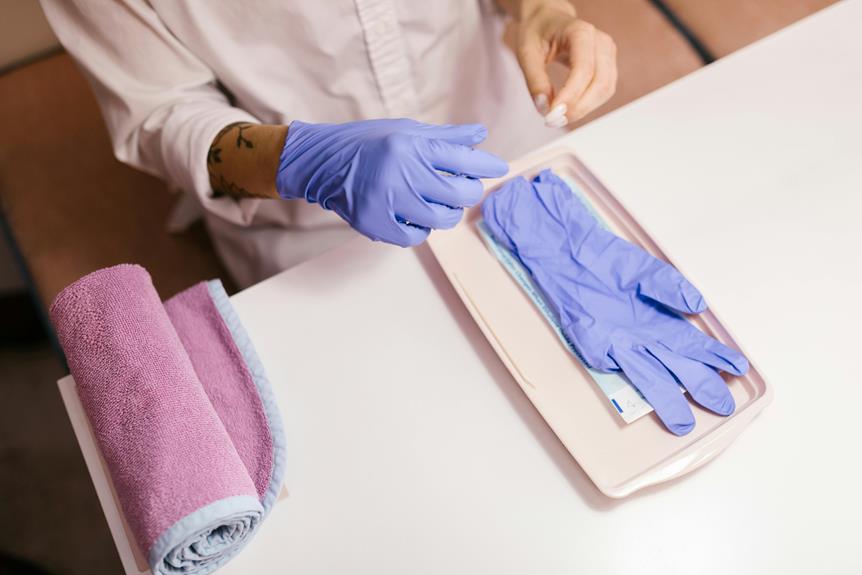Froomes Unveils Cost of Beauty Standards
In a powerful personal account, I disclose the immense psychological and emotional toll that pervasive beauty standards have taken on my own journey of self-acceptance and recovery from disordered eating. Cultural icons and media scrutiny perpetuated harmful beauty ideals, fueling my own body image struggles and unhealthy behaviors. As I navigated the complexities of modern diet culture, I chose to prioritize mental well-being over societal pressures, finding strength in rejecting dieting as a path to happiness. My recovery story emphasizes the importance of self-acceptance and empowerment – a journey that offers valuable insights into the true cost of beauty standards.
Key Takeaways
- Froomes shares personal struggles with body image fueled by societal beauty standards and intense media scrutiny of cultural icons.
- Eating disorders and unhealthy behaviors were often consequences of the pressure to conform to specific body types.
- Froomes' recovery journey emphasizes the importance of mental well-being and self-acceptance over dieting and societal ideals.
- The complexities of modern diet culture, including the ethical dilemmas around weight-loss drugs, highlight the need for nuanced approaches to physical and psychological health.
- Greater representation and celebration of beauty diversity in media are essential to counteract the perpetuation of unrealistic beauty standards.
Toxic Cultural Influences on Beauty
How have the toxic messages from popular culture in the noughties impacted our perceptions of beauty?
Growing up, I was heavily influenced by cultural icons like Britney Spears and The Pussycat Dolls. The word "hot" became synonymous with desirability, and I struggled to understand the implications of wanting to be seen as attractive.
The intense scrutiny faced by women in the media perpetuated harmful beauty ideals, shaping my own insecurities. As the standards of beauty have evolved, it's essential to unpack how these toxic cultural influences continue to affect our self-image and relationship with our bodies.
Personal Struggles With Body Image
The eating disorder that developed during my teens and twenties was certainly fueled by the relentless desire to fit the beauty standards perpetuated by society. The pressure to achieve a certain body type led to unhealthy behaviors and mental health challenges.
My first job as a health and fitness editor only intensified this obsession with body image. However, running marathons marked a turning point, as I began to shift my focus towards body positivity and self-love.
Recovery emphasized the importance of self-acceptance, rejecting the notion that happiness can be found through dieting or conforming to societal ideals.
Complexities of Modern Diet Culture
In recent years, the discussion around weight-loss drugs like Ozempic has become increasingly complex. As I researched the topic, I uncovered the dilemmas surrounding the use of appetite suppressants.
While these drugs may offer a quick fix for weight loss, they also raise concerns about encouraging unhealthy behaviors and perpetuating the narrative that physical appearance is the key to happiness.
As I navigated my own recovery from an eating disorder, I made the conscious decision to forgo these pills, prioritizing mental well-being over the pursuit of societal ideals.
The complexities of modern diet culture are multifaceted and require a nuanced approach that addresses both physical and psychological well-being.
Media's Perpetuation of Unrealistic Ideals
Media's role in perpetuating unrealistic beauty ideals has long been a subject of scrutiny. From the portrayals of Marilyn Monroe to Paris Hilton, cultural icons have often been labeled as role models without consent or preparation.
This influence has led to conflicting messages about femininity and desirability. Consider these key points:
- The duality of admiration and criticism faced by pop culture figures.
- The portrayal of women in music videos contributing to mixed messages about sexuality.
- The perpetuation of harmful beauty ideals through the scrutiny faced by women in the media.
- The need for greater media representation and celebration of beauty diversity.
Recovery and Self-Acceptance as Empowerment
Embracing recovery and self-acceptance has been a profound journey of empowerment for me.
After years of struggling with an eating disorder, I've learned to prioritize my mental well-being over societal pressures. The road to recovery isn't without challenges, but I've found strength in rejecting dieting as a means to achieve happiness.
By sharing my personal story, I hope to inspire others facing similar battles. As Froomes states, "Recovery is a journey, not a permanent struggle."
Through this empowering process, I've discovered the true meaning of self-acceptance and the freedom it brings. It's a powerful message of hope for those seeking to break free from the cost of beauty standards.
Conclusion
Lucinda Froomes' powerful story underscores the immense toll that unrealistic beauty standards can take on individuals. Her candid account serves as a crucial reminder to prioritize mental health over societal pressures, and to embrace a more inclusive vision of beauty. By rethinking the narratives we perpetuate, we can empower ourselves and others to find true self-acceptance.







